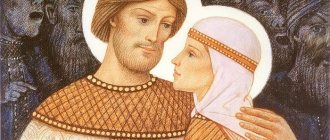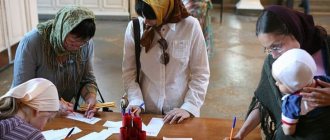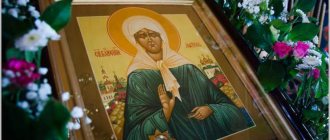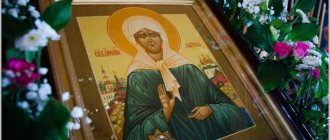Russian Orthodoxy and Traditions post pinned
Priest of Our Time
Rare icon of the Mother of God “Non-idle”.
In Rus', a woman carrying a child under her heart was called non-idle, that is, being in a state opposite to idleness, idleness.
In Georgia there is an ancient fresco depicting the Unidle Mother of God. This shrine is especially revered by women who want to give birth to a child. There are revered copies of this icon in Orsk in the convent in the name of the Iveron Icon of the Mother of God, in the Kortskhelsky Monastery in honor of the Iveron Icon of the Mother of God.
Many church words came from the Old Russian language. Nowadays they are no longer used, and believers (even those who have been visiting the temple for a long time) often puzzle over the meaning of this or that expression.
The meaning of women in Orthodoxy
A woman represents the opposite hypostasis of human nature to a man. Uniting in a God-blessed marriage, they complement each other and form “one flesh” (Gen. 2:24). In this state, a man and a woman must grow spiritually and continue the race (Gen. 1:28). But only a woman has a high calling to carry and preserve another life within herself:
“A woman... will be saved through childbearing if she continues in faith and love and holiness with chastity” (1 Tim. 2:15).
Archpriest Andrei Tkachev calls the seven a shrine and an altar for a woman. This is often an unnoticed, routine service that is not always properly appreciated. But it is the family that is the axis of the world around which everything revolves:
“A woman-mother, a woman-housewife, a woman-loving spouse is a creature who holds the whole world in her palms. I really like the English proverb: “The hand that rocks the cradle rules the world.” After all, think: all Newtons, Shakespeares, Napoleons were born by a woman, nurtured by a woman, raised by a woman.”
Priest Dmitry Sokolov calls love and self-sacrifice the need of the female soul, the law of her being:
“What feeling has become a model of pure, living and deep love among all peoples and in all languages? The love of a woman, the love of a mother, who, after all the suffering, having worked the day, been awake at night, considers one smile, the caress of a child, a sufficient reward for herself.”
Holiday woman.
Women, Relationships, Psychology Conditionally and very roughly, all women can be divided into two types: the woman-mother and the woman-holiday. The first type are good housewives, they strive to have a family and raise children. The second is muses, they inspire men, they provide them with a break from the mundane everyday life for the soul and body, but everyday problems are not for these women. One can give a striking example of such a female holiday: these are hetaeras in Japan. There is a clear division between hetaeras and wives. There is no need to find out which one is better. Each is good in its own way, but there is a huge difference between them.
Marriage is a stairway to God
It should be remembered that childbirth is an important, but not the dominant function of marriage. Being in a marital union, a man and a woman are primarily called to diligent spiritual improvement. Its steps lead to the highest goal - unity with God, salvation in Christ.
The Apostle Paul taught that love is the main virtue, without which all other spiritual achievements are meaningless (1 Cor. 13:1). The Holy Church understands marriage as an ideal school of true sacrificial love. Archpriest Gleb Kaleda notes:
“In marriage and love, a person transfers the center of interests and worldview from himself to another, gets rid of his own egoism and egocentrism, immerses himself in life, entering it through another person. To some extent, he begins to see the world through the eyes of two. The love we receive from our spouse and children gives us fullness of life, makes us wiser and richer.”
Holy Scripture likens marriage to the union of Christ and the Church (Eph. 5:22-25). Just as the Church honors the Lord, so a wife should honor her husband. She was created as a faithful assistant, a friend for him. Archpriest Dmitry Sokolov notes:
“A wife should, prompted by love, work for his good and especially for the eternal good... Not only to give a man comfort in this life, but also to help him achieve eternal life.”
And the husband is called to love and protect his wife, like Christ, who ascended to the cross for the sake of the Church. The attitude towards a spouse should be prudent and reverent, as if towards a fragile vessel (1 Pet. 3:7). When spouses work on themselves, cultivate the virtue of love, visit church together, participate in prayer and the Sacraments, then, according to the Monk Paisius the Holy Mountain, they inextricably merge into one and are sanctified by the presence of the Third - the Sweetest Christ (“Words”, volume 4).
The concept of "idleness"
To better understand the word “not idle,” we should first consider the meaning of the concept “idleness.” Orthodoxy understands idleness as the opposite of labor and diligence. This is idleness, laziness, empty words or actions. Archpriest Fyodor Povny notes that through idleness we waste the spiritual strength sent to us from God. The Lord warns us against this sin:
“For every idle word that people speak, they will give an answer on the day of judgment” (Matthew 12:36).
The Monk Simeon the New Theologian teaches that the word that is not supported by personal labor and experience is also idle. When a person teaches others what he himself has not learned. When he is wise not truly, but only externally (“Words”).
Also, idleness is a relaxation of the soul, inattention to one’s spiritual state. This sin poisons and corrupts human nature, and certainly entails many other passions. Saint Tikhon of Zadonsk instructs:
“The enemy approaches no one more easily than one who lives in idleness. Always remain in good works, that is: either read books, or pray, or be in the mind of God, or do some manual work” (Creations).
A non-idle woman in Orthodoxy - what does this mean?
A non-idle woman in Orthodoxy is one who carries a child within herself. This name has been used in Rus' since ancient times. Even today, in church commemorations, it is customary to indicate pregnant women with the addition of this adjective. Why are they called that?
A pregnant woman cannot be idle. Even when resting, she constantly works, interacting with the fetus, supporting its life. Every moment of pregnancy is filled with meaning. Bearing a child and giving birth is a great feat, associated with various physical and psychological tests. Therefore, “non-idle” women need the active support and prayers of others. Archpriest Fyodor Borodin notes:
“It’s rare that a woman’s situation doesn’t change: it’s difficult to get up early, she feels nauseous, and is overcome by weakness. A pregnant woman becomes mentally much more vulnerable, nervous... A pregnant woman cannot be approached with ordinary standards. Family life changes; the husband must behave differently, endure more, and be more forgiving, and bear a much greater burden.”
The priest reminds that a child needs to be introduced to God’s grace even before birth. A mother should sanctify herself and her fetus through prayer, attending divine services, and participating in the Sacraments of Confession and Communion. The Monk Porfiry Kavsokalivit teaches:
“Women should realize how highly God has honored them by allowing them to become mothers. From the moment the fetus is conceived, they carry a second life within them... They must pray with love for their children. The mother’s holy feelings and her holy life sanctify the baby from the very moment of his conception.”
There are special Orthodox prayers for “non-idle” women. Their main patron is the Virgin Mary, who carried and gave birth to the Savior of the world. There is even a special icon of the Mother of God “Non-idle”, in front of which it is customary to pray for a successful pregnancy and successful childbirth. This is also traditionally asked in front of the “Help to Childbirth” and “Feodorovskaya” icons.
Delivery methods
Delivery within Russia is carried out free of charge by Russian Post and the transport company SDEK.
Pickup and delivery in Yaroslavl
Pickup is possible from our workshop, located at Yaroslavl, Babich 5. Weekdays from 9:00 to 18:00. Weekends from 12 to 17:00.
In Yaroslavl there is free delivery within 24 hours from the moment the order is placed, payment to the courier is possible by card or cash.
Other countries
Delivery to other countries is carried out by the transport company SDEK, EMS Courier Service and Russian Post. The cost is calculated individually.
Payment is accepted via PayPal.
*To send icons abroad to the Russian Federation, a package of documents is required, officially confirming that the work of art is not a cultural or historical value. The cost of processing such documents is calculated individually and paid by the client. The processing time takes 1-3 weeks.
Prayers for non-idle (pregnant) women
Prayer to the Lord
Lord Jesus Christ our God, born of the Eternal Father to the Son before the ages and in the last days, by the good will and assistance of the Holy Spirit, He deigned to be born of the Most Holy Virgin as a child, given birth and laid in a manger, the Lord Himself, who in the beginning created man and yoked woman to him, having given them a commandment: grow and multiply and fill the earth; have mercy, according to Thy great mercy, on Thy servant (name), who is preparing to give birth according to Thy commandment. Forgive her voluntary and involuntary sins, by Thy grace grant her the strength to be safely relieved of her burden, keep her and the baby in health and well-being, protect me from Thy angels and save her from the hostile action of evil spirits, and from all evil things. Amen.
Prayer to the Mother of God
Most Holy Virgin, Mother of our Lord Jesus Christ, who weighed the birth and nature of mother and child, have mercy on Thy servant (name) and help at this hour so that her burden may be resolved safely. O all-merciful Lady Theotokos, even though you did not require help in the birth of the Son of God, grant help to this servant of yours who requires help, especially from You. Grant her blessings at this hour, and grant her the birth of a child and bring her into the light of this world at the right time and the gift of intelligent light in holy baptism with water and spirit. We fall down before you, Mother of the Most High God, praying: Be merciful to this mother, the time has come for her to be a mother, and beg Christ our God, who has become incarnate from you, to strengthen you with his power from above. Amen.
Source
An idle woman: 2 prayers to the Mother of God for the successful bearing of a fetus
Not an idle woman - this is what they called in Rus' a woman who carried a child under her heart, and also meant that she was not idle.
A woman was always looked at as the guardian of a new life; they tried to surround her with care and warmth. The term itself meant that a woman's pregnancy was seen as a matter, and even more so, a service to society and the church.
The Holy Bible also speaks about this:
“A woman... will be saved through childbearing if she continues in faith and love and in holiness with chastity”
The meaning of the word “non-idle” in Orthodoxy is associated with work and experience
Let us consider in more detail the meaning of the word “non-idle”. The word comes from the simple word idle, idleness.
To Orthodoxy - what does it mean? In the Orthodox Church, an “idle word” is a word that is not backed by the fruit of real experience, experienced, tortured, suffered in tears.
For example, when a person says that he needs to brush his teeth, but never brushes them himself. But it turns out that a person says an idle word - but at the same time it is not idle. The idea itself is true, but in reality it is not at all.
The Monk Simeon the Theologian also spoke about this word and its meaning:
“An idle word is not only a useless word; but idle (αργος - unmade) should also be called such a word that we speak before we do it by deed and know by experience what we are talking about.
If I, without despising the glory of this world and not rejecting it with all my soul, teach others to run away from it, then will not my word be idle, unmade, empty, and will I not be condemned as a liar?
And again, if I, having not received with consciousness and a sense of the mental grace of the Holy Spirit, having not become taught from God through this grace and not being vouchsafed to receive from above the words of wisdom and reason, I rush without restraint to interpret and explain the Divine Scriptures and act in the rank of teacher, armed being only external wisdom, will the Lord leave this without reproof, and will He not demand an account of this from me?
It turns out that an idle woman is one who does not bear fruit.
Not everyone has the opportunity to get married, but everyone has the opportunity to engage in useful Christian deeds, for example, charity, serving people.
The Orthodox Church considers idleness to be laziness, and therefore a sin that must be gotten rid of by fasting and prayer. A woman who is idle needs to realize this and confess her sins. Then receive a blessing and take communion.
What does "idle" mean? For example, if a woman could do a good deed, but at the same time spends this time surfing the Internet.
Expectant mothers in the church pray to the icon of the Mother of God “Non-idle”
Every expectant mother in the church knows who to turn to and light a candle for the birth of a child.
There is an icon of the Mother of God “Non-idle”, to which all women who want to give birth and bear fruit safely pray.
There are a lot of such icons of the Mother of God. The most famous one looks like this:
There are revered lists of this “Non-idle” icon in Orsk in the convent in the name of the Iveron Icon of the Mother of God, as well as in the Kortskhelsky monastery in honor of the Iveron Icon of the Mother of God
This icon is an illustration of the story of the Holy Gospel about how the holy righteous Joseph learned that the Virgin was betrothed to him
“has with child the Holy Spirit” and wanted to secretly release Her
The Mother of God stands with her right hand raised to her head, wiping away tears, and with her left hand she points out to Joseph that “she does not know her husband,” she is a Virgin.
Righteous Joseph - according to the New Testament, the betrothed husband of the Most Holy Theotokos. Here he is with the baby Jesus Christ in his arms
Not only pregnant women pray to the icon, but also those women who cannot become pregnant or have children.
There are also prayers that every woman can read in front of the icon every day.
The prayerful sigh of an idle woman whom God blessed with the fruit of her womb:
And one more thing: this is the inheritance from the Lord: children, the fruit of the womb, a reward from Him.
I thank You that You made me partaker of this blessing and Your gift in my married state,
and I pray to You, deign to bless the fruit of the womb that You have given me, to bless and bless it with Your Holy Spirit,
accept Your children into the number of your beloved ones and make them partakers of St. sacraments of the church of Your beloved Son, my Lord Jesus Christ,
so that through this he may be sanctified and cleansed from the hereditary sin in which he was conceived.
Lord God! I and the fruit of my womb are children of wrath by nature, but You, beloved Father, have mercy on us,
and sprinkle the fruit of my womb with hyssop, that it may be clean; wash it, and make it whiter than snow. Strengthen and preserve him in the womb until the hour when he must be born.
This fruit of my womb was not hidden from you when it was formed in the womb,
Your hands formed him, You gave him life and breath, and Your supervision was to preserve them.
Keep me from fear and fright and from evil spirits who would like to damage and destroy the work of Your hands.
Grant him a rational soul, and cause his body to grow healthy and undefiled, with whole, healthy members, and when the time and hour comes, allow me by Your mercy.
Grant me strength and strength for birth, make him happy with Your almighty help and ease my suffering,
because these are Your work, the miraculous power of Your omnipotence, the work of Your mercy and mercy.
Remember the word You spoke: You brought me out of the womb; I am committed to Aa. from birth; from my mother's womb You are my God; You laid me to rest at my mother's breast.
You are God, knowing and seeing the needs of all people; You said: when a woman gives birth, she suffers sorrow, because her hour has come. God!
For the sake of this heartfelt compassion of Yours and for the sake of Your heart filled with pity, I pray to You, deign to ease my sorrow, which You foresaw, and bring into the world the fruit of my womb, with a healthy, living body and intact, well-formed members.
I entrust it to You, into Your almighty, fatherly hands, into Your mercy and mercy, and I place it, Lord Jesus Christ, in Your holy embrace, may you bless this fruit of my womb, as You blessed the children brought to You when you spoke : “Let the children come and do not hinder them from coming to Me, for such is the Kingdom of Heaven.”
Savior! So I offer You this fruit of my womb; lay Your gracious hand on him. Bless him with the finger of Your Holy Spirit and grace him, when he comes into this world, with holy, blessed baptism;
sanctify and renew him to eternal life through regeneration, make him a new creature, wash and cleanse him with Your blood, make him a member of Your Holy Body and Your holy Christian Church, so that Your praise may be uttered from his lips,
Prayer of non-idle women for a successful resolution:
Remember, O Blessed One among women, with what joy and love You went hastily to the mountainous country to visit Your relative Elizabeth during her pregnancy, and what a wonderful effect Your gracious visit had on both mother and baby.
And according to Your inexhaustible mercy, grant also to me, Your humble servant, to be freed from the burden safely; grant me this grace,
so that the child, now resting under my heart, having come to his senses, with a joyful leap,
like the holy baby John, they worshiped the Divine Lord Savior, who, out of love for us sinners, did not disdain to become a baby Himself.
May the unspeakable joy with which Your virgin heart was filled at the sight of Your newborn Son and Lord, sweeten the sorrow that awaits me amid the pains of birth.
May the life of the world, my Savior, born of You, save me from death, which cuts off the lives of many mothers at the hour of resolution, and may the fruit of my womb be numbered among the elect of God. Hear, O Most Holy Queen of Heaven, my humble prayer and look upon me, a poor sinner, with the eye of Your grace; do not shame my trust in Your great mercy and overshadow me.
Helper of Christians, Healer of illnesses, may I also be honored to experience for myself that You are the Mother of mercy, and may I always glorify Your grace, which has never rejected the prayers of the poor and delivers all those who call on You in times of sorrow and illness. Amen
Let's summarize
- The Orthodox Church calls pregnant women a non-idle woman. This word means “busy with business” (in this case, this business is bearing a baby, the main female purpose on earth).
- Idleness (voluntary refusal of pregnancy in marriage) is considered a sin for which one must confess.
- Those who are not idle pray to their own icon of the Mother of God.
- When leaving notes in church for a pregnant daughter or friend, it is customary to add “not idle” or “pregnant” to her Christian name.
This is what the prayers of pregnant women sound like for a happy pregnancy and a safe birth (recorded by a priest):
This product is not available for delivery to your region
We always strive for the best to please our customers with the best prices.
Best regards, Wildberries online store.
Added to Waiting List
Find out about admission
Coming soon
- Free shipping
- 21 days for return
The Icon of the Mother of God of Non-Holidays, a copy from the miraculous fresco, which is located in Georgia in the Church of the Assumption of the Blessed Virgin Mary in the village of Dirbi, hence another name - Dirbi. The icon is unique in that it depicts the Virgin Mary in the sixth month of pregnancy; there is no such image anywhere in the world. Not idle means a state opposite to laziness and idleness. This is what they called stomach-carrying women in Rus'. Childless couples and women preparing to become mothers resort to this image with deep faith and prayer. The icon is made on a linden board 2 cm thick, made using UV printing with natural pigment paints on a chalk ground (gesso). Additionally, the board is coated with a special flax-based oil to preserve and protect the natural structure of the wood. Icon size 16*9 cm.
Information about technical characteristics, delivery set, country of manufacture and appearance of the product is for reference only and is based on the latest available information from the manufacturer
We always strive for the best to please our customers with the best prices.
The “Non-idle” Icon of the Mother of God (that is, in a state of pregnancy, preparing to become a mother) was revealed to Georgia in the Dibri Monastery, Ruis-Urbnis diocese (in the revived monastery of the Holy Dormition of the Mother of God) during the restoration of frescoes of the 14th century.
The icon is an illustration of the story of the Holy Gospel about how the holy righteous Joseph learned that the Virgin betrothed to him “was with child of the Holy Spirit” and wanted to secretly release Her (Matthew 1:18-19).
The Mother of God stands with her right hand raised to her head, wiping away tears, and with her left hand she points out to Joseph that “she does not know her husband” and is a Virgin (Luke 1:34).
The ruling bishop of the Ruis-Urbnis diocese of the Georgian Orthodox Church, Metropolitan Job (Akiashvili), gave his blessing in 2001 to write a copy of the “Non-idle” icon depicted on the fresco, which was done by Hieromonk John Okhanashvili.
The image soon spread in Georgia and became one of the most revered. Before him, those who are deprived of this gift for some reason pray for the gift of childbearing. They ask for help during pregnancy and at birth, for raising children in piety and their further well-being.
Through the efforts and diligence of the parishioners of the Church of the Icon of the Mother of God “Helper in Childbirth” in the Obolonsky district of Kiev, a list of the icon with the blessing of the Georgian Patriarch Elijah was written in Georgia by the icon painter Tamara and donated to our Temple with a small piece of the Chiton of the Blessed Virgin Mary, which is kept in the Georgian Museum .
“They decided to order the icon of Our Lady of the Joy of All Joys of Seraphim Tenderness for our head of the HR department, an Orthodox woman, in connection with her retirement.
Our slogan is that gifts must be given with all our hearts and chosen as if they were for ourselves, especially an icon. An icon, in our understanding, should be handwritten, and especially for a gift, since it is not written by a machine and the icon painter puts his soul into it and the Icon becomes alive.
The icon radiates light and warmth. And my colleagues are simply delighted, which is difficult to express in words.
I would like to wish your workshop prosperity and never forget that the masters reflect the internal structure of the icon. Keep peace of soul and sow love and repentance with your images.
“I was looking for an icon for my niece for her birthday. He prayed that the namesake saint would have some kind of spiritual participation in her life.
I chose a handwritten icon because I wanted to convey more life. Everyone really liked the icon. And the very image of the saint and the magnificent execution of the icon painter evoke deep sympathy. I believe that the goal is achieved - life is communicated.
On my own behalf, I can only wish for one thing: that we all seek more and more His Face, from Whom and from Whom are all things.
Alexey, St. Petersburg »
“I was looking for a personalized icon. I thought about my patron saint during one of my Sunday school classes.
I found information about the workshop “Before the Icon” on the Internet. There is no printed icon of the Holy Martyr John of Rudinsky; moreover, the photograph of the Holy Martyr has not survived. This became clear after a long correspondence with the archives. Since the icon was missing, the only option left was to have it painted.
I had several icon painting workshops under consideration, but after talking with the icon painter Tatyana, I realized that I could entrust the painting of the icon to your Workshop.
I want to thank you for undertaking to paint an image that no one had painted before and for doing it, in my opinion, responsibly and professionally. Special thanks to the icon painter Tatiana, who, despite the absence of photographs, conveyed the subtle spiritual side of the Saint’s personality.
I wish the Workshop “Before the Icon” further development and always take on difficult projects with the same enthusiasm!
Low bow to you. Regards, Ivan. Moscow "
“I ordered icons, a wedding couple for my youngest daughter and my poor son-in-law.
Handmade in canonical execution inspires prayer with its sincerity.
Young people come to faith later. But it comes through adults, who must carry the national culture, traditions, and customs. And at the same time, the scale of what happened was impressive. We are in Uzbekistan. You rarely see something like this here. Even representatives of the non-Christian world were impressed by the very fact of the existence of the concept of “Wedding couple”. And here it’s also live, and handmade.
THANK YOU. I would like you to grow and expand. HEALTH TO US ALL. THANK YOU. The desire to order more from you is only growing.
- Number of characters 1
- Number of independent compositions in the icon
- Tempera paints
- Carving Embossing in gold
The icon depicts the Mother of God awaiting the Infant Christ or the Unidle One - this is how in Rus' they called a woman carrying a child under her heart (being in a state opposite to idleness). In Georgia there is an ancient fresco depicting the Unidle Mother of God. It is an illustration of the story of the Holy Gospel. The holy righteous Joseph, having learned that the Virgin betrothed to him “was with child from the Holy Spirit,” wanted to secretly release Her (Matthew 1:18-19).
The Mother of God stands with her right hand raised to her head, wiping away tears, and with her left hand she points out to Joseph that “she does not know her husband” and is a Virgin.
In 2001, the ruling bishop of the Ruis-Urbnis diocese of the Georgian Orthodox Church, Metropolitan Job, blessed to write a copy of the “Non-idle” icon depicted on the fresco, which was performed by Hieromonk John Okhanashvili.
Soon the image spread in Georgia and became one of the most revered. Before him they pray for the gift of childbearing. They ask for help during pregnancy and at birth, for raising children in piety and their further well-being.
In the temple you can submit notes about the health of a pregnant woman
Many people ask, is it possible to somehow pray for a pregnant woman? The answer is yes.
1 – a note is written about the health of the pregnant woman. In such notes it is necessary to indicate that the woman is not idle. Even if you write “pregnant,” the priest will understand what you are talking about.
The note will cost about 100 rubles. But you need to find out the exact price information in the temple itself where you are going to write the note.
A note about health should be written like this: on a small blank sheet of paper that will be given to you in the temple, it will be written about health, write below in your own hand - non-idle servant of God, and then indicate the name of the pregnant woman.
On this piece of paper, on any of the lines, you need to write the name of the person for whom you are submitting a note
2 – order a magpie about the health of a pregnant woman. Sorokoust means that priests will pray for a person in the temple for a whole month. You can order it by going to a candle shop and saying that you want to order a magpie for a pregnant woman. Here you only need to dictate the person's name.
Sorokoust about health - costs about 600 rubles
You can also pray at home, asking in your own words from God for help in the intercession and well-being of a pregnant woman during childbirth. The main thing is to ask from a pure heart, and the Lord and the Most Holy Theotokos will definitely help.
Source
Similar questions
4 Replies
Usually in such cases they write “nepr.”, that is, “not idle.” For example: “About health nepr. Olga."
Non-idle is the opposite state of being idle.
The word 'idle' means empty, hence the holiday, that is, an empty, non-working day.
The word idle comes from the word 'empty', and referred to an empty vessel, a jug. Empty, in the sense that over the edge of the vessel, as if everything had flowed out through a threshold, there was nothing left in it.
In turn, 'flowed down the horn' referred to the phenomenon of water flowing in a river through small steps. Observant Slavic ancestors noticed that such a flow occurs as if along a horn, as if the horn of a bull was placed on one end, and water from the upper part smoothly flows along the convex part of the horn to the lower one, forming a step.
Thus the word holiday comes from the word 'horn'.
Peace to all the idle!
The word right does not apply here.
It seems to me that these instructions are completely meaningless. God knows everything about the people for whom we ask and does not need our hints.
What happens if you don't indicate that a woman is pregnant? God won't know about this? Will he “refuse” to help resolve the burden? The sexton in the altar, reading the name, seeing an indication in some special way, will he pray for a woman unfamiliar to him and her situation, and will God, having learned from the sexton, help in childbirth? But won’t saying the word “unidle” help?
It seems to me that religious effort should be directed to the sincerity, constancy and strength of our prayer for our loved ones, and not to formal things. This will be better for us and for our loved ones.
Source
An idle woman is...
Less often in Russia they said this about a woman busy with work . The word "idle" was also used at that time. It meant “empty,” “idle,” “not occupied with anything.” You can still hear the expression “idly staggering,” that is, “one who walks around without doing anything.” They can also say “an idle word” - these will be words not supported by experience.
But more often (and this is the interpretation that has survived to this day, mainly in church terminology) this is what they said about a woman who carries a child under her heart .
In the Bible, the main task of women was the birth of children (“a woman... is saved through childbearing”). And the more children a believer has, the more Orthodoxy she respects. Pregnancy in the Christian faith is considered the main job of the fairer sex. Hence the non-idleness - after all, carrying a baby under her heart, a woman does not “sit idle.”
Getting rid of idleness
It is easy to guess that life in a marriage, but in a childless status, is called idleness by faith.
Many modern ladies, after being registered at the registry office and even getting married, prefer not to have children for some time, living for themselves. The Orthodox Church considers such women to be sinners and lazy, calling them to repent of this idleness, fast as a sign of humility and pray.
But there are other cases: a couple lives in love and prays for children, but the years go by and still no children. Such women go to the temple and read prayers for deliverance from idleness, that is, simply put, asking the Lord and the saints for pregnancy .
Such an idle woman can:
You can address the images in your own words, simply pouring out your soul to them. There are also special prayers for pregnancy. For example:
Less often, the church calls a woman idle, regardless of her married status, who devotes all her free time to entertainment instead of doing godly deeds (prayers, helping the poor).
What is the power of praying for others?
First, let's figure out why we write memorial notes or fill out little books (memorial books) with the names of living or deceased relatives or friends. The note speaks of our desire to remember at home and not forget anyone during the reading of morning prayers or our request to pray for someone in church during the liturgy, prayer service or other services.
We read repeatedly in the Holy Scriptures about the power of prayers for others. Let's remember the miracle of turning water into wine at the wedding feast in Cana of Galilee (John 2:1-11); the miracle of healing of the centurion's servant from Capernaum (Matthew 8:5-13); the miracle of healing of a paralyzed man, whom his friends lowered on a stretcher through a dismantled roof to Jesus Christ (Mark 2:1-12). In each of these cases, someone interceded with the Lord, that is, prayed, for other people. In particular, these were the requests of the Mother of God, the centurion and four friends.
When we turn to God with various requests for other people, we perform the prayer of intercession. That is, we take upon ourselves the boldness to ask God not for our own needs, but for the salvation of those close to us.
“Thou shalt love the Lord thy God with all thy heart, and with all thy soul, and with all thy mind: this is the first and greatest commandment; the second is similar to it: love your neighbor as yourself,” said Jesus Christ (Matthew 22:37-39). Prayer for others is a manifestation of love for one's neighbor.
How to Pray to Pregnant Women
Pregnant women turn to the icon of the Mother of God “Unidle . This is a slightly unusual image, in which the Mother of God is depicted without a baby in her arms, but with a child in her womb.
It is customary to read the following prayer:
By the way, this icon did not appear just like that. This is an illustration of a scene from the Gospel in which Saint Joseph learned that his betrothed Mary was carrying a child under her heart. He decided to let her go. With one hand the Virgin in the icon wipes away her tears, and with the other she swears that she did not know the man and did not cheat on her betrothed.
As we know, after this conversation, righteous Joseph, who loved Mary very much, did not abandon her, and subsequently raised her Son as his own.
Some non-idle women are afraid to go to church, because you have to stand there a lot, sometimes there is a crush, and some superstitious ladies are even afraid that they will be jinxed (although superstition is not befitting of the Orthodox). In fact, even the Apostle Paul encouraged pregnant women to visit the House of God more often. He said that regularly visiting a place of prayer is very beneficial for young mothers .
Don't be afraid of any evil eye. But concerns about crowds at large services are justifiable. Therefore, you can attend church on non-holiday days, but sit during the service - you should not overwork yourself even for the sake of prayer, so as not to harm the baby.
Is prayer necessary during childbirth?
Even priests do not have a clear answer to this question.
Some say it's not needed. Others advise praying not to the woman herself, but to her closest relatives. Still others claim that in the hour of the most difficult “work”, prayer will support and strengthen.
In any case, you can take a small laminated (its surface can even be wiped with an antiseptic) “Childbirth Assistant” icon to the delivery room . She is considered the strongest at such moments. In addition, on the back of the icon there will be a prayer to this icon.
How to pray for pregnant women
There are special prayers for non-idle women (relatives, friends, neighbors). They are read both in church in front of icons and at home.
Some people pray for both the woman’s health and her child’s health. This is wrong - you need to turn to God only for the mother (she is baptized, but the baby who has not yet been born is not yet).
You can also leave notes . The word “pregnant”, “fruit-bearing” or “non-idle” should be added to her name (ecclesiastical, not secular).
If you are very worried about the health of such a woman, or she is about to give birth, you can order a sorokoust for her health. Thanks to this, priests will pray for her health in the temple for a whole month. Sorokoust is ordered from a candle shop.
Variety of women's holidays.
Such women are confident that if they are able to maintain a constant festive atmosphere, then any man will consider them bright and desirable. Let's try to compare their behavior with specific holidays.
Woman Holiday - New Year
New Year is one of the most favorite holidays. It is clear that on New Year's Eve you cannot lie down and fall asleep, you are supposed to have fun, so that later you can boast to your friends and colleagues about your eccentricities. The New Year woman is also absolutely confident in her irresistibility and that she is the best and most important. Male recognition of her merits is not enough for her; she wants to seem better than her partner. People around him should compliment his woman and talk about how lucky he is to have her. She strives to be the center of attention so that people appreciate her wit, beauty, and spiritual qualities. At first, the man likes it, because it warms his pride. But time passes and he feels that his self-esteem is falling, and that he is an uninvited guest at this holiday. At first glance, he puts up with this, but discontent begins to nest in his soul. After all, he also wants others to appreciate him. And over time, a man may get tired of the New Year and want something simpler, like Tractor Driver’s Day.
Holiday Woman - Carnival
Who would argue that carnival attracts attention? But it should be remembered that the longest carnival lasted no more than two weeks, and over time, people began to reduce its duration, since not everyone can withstand so much fun. And in some countries, doctors even give recommendations for people with heart or nervous system diseases, namely: watch the television broadcast of the holiday, but not take part. The Carnival holiday woman is so enchanting and active that a man, being next to her, cannot remain indifferent. And she is not interested in whether her partner is tired; she does not intend to stop the holiday and move on to everyday life. The fun continues without slowing down. Even if a man has expressed a desire to spend a quiet evening watching TV, she will still strive to entertain him by any means possible. But it is known that the strong half of humanity is not so susceptible to active fun. They just want to lie on the couch and do nothing. The holiday woman would do well to remember that Carnival must, at least for a while, take a break.
Woman Holiday - Birthday
In childhood, everyone, without exception, loves and looks forward to this holiday. And, growing up, we perceive birthdays with a little sadness, as the years pass by. Women, oddly enough, love to celebrate birthdays, but for men it can be stressful, and anniversaries even more so. For some reason, it is difficult for the strong half of humanity to be the hero of the occasion, perhaps because they are less emotional and they do not really want to bow as a sign of gratitude for congratulations. In addition, due to the passivity of the role of the birthday boy, they feel quite tense. If a man was not allowed to have his birthday the way he wanted, for example, in nature, but was taken to a restaurant to celebrate, then there is every possibility that he will get drunk. Because it’s easier to survive disappointment this way. So a woman on a holiday of this type can be a real test. Their increased attention, outbursts of delight, and exaggeratedly tender glances can stress a man out. Men love attention, but everything should have moderation.
Woman holiday - March 8
Men don't really like this holiday. It seems that there is an opportunity to show oneself from the best side, but at the same time, the requirements are high and incomprehensible. Gifts need to be given, chores need to be done. In addition, banal and formal congratulations are not accepted. On this day, you need to constantly be there, while finding warm and affectionate words. In short, for men this is not a holiday, but an ambush. And there is no way to bypass it. Absences for fishing, business trips and other men's affairs are regarded as an escape. So the woman who celebrates March 8th is just as demanding and capricious. But she doesn’t ask for anything, she just waits, and then with all her appearance she will let you know whether you met her expectations. If she voiced her desires, it would be easier for a man to satisfy them, but she remains silent, because he must guess for himself if he loves. And the man experiences a feeling of anxiety, followed by irritation. How can you please your partner if you don’t know what she wants? So the desire to give gifts at all gradually disappears.
Not idle: the expectant mother in the temple
As an expectant mother, from the point of view of the Orthodox Church, it is most favorable to spend time in church.
In church society, the status of a pregnant woman was always invariably high; she was looked upon as the guardian of a new life, a new god-like personality, and was surrounded with special care and concern. Traditions helped the expectant mother bear spiritually and physically healthy heirs.
In Rus', a woman carrying a child under her heart was called non-idle, which means being in a state opposite to idleness, idleness. This term itself indicates that pregnancy was considered by society as a matter or, moreover, a service to society and the Church. The Holy Bible also speaks about this:
"Woman. He will be saved through childbearing if he continues in faith and love and holiness with chastity” (1 Tim. 2:15).
Skill comes from experience and study. It seems, what should a pregnant woman study? The wise Lord created our body in such a way that all biological processes of development and growth of the fetus occur without the participation of the mind and will, so to speak, automatically. Biological - yes, but a person is not only a body, but also a soul. And if you want to give birth to a kind, loving child, you can’t do it without difficulty. Science also testifies to this. Prenatal psychology, which studies the psyche of unborn children, proves that the main personal characteristics are formed precisely during the period of intrauterine development of a person.
Even the ancient Roman patricians sought to surround their fruit-bearing spouses with luxury and peace, to protect them from all kinds of unrest and unpleasant sights. Christianity took a deeper look at the problem - the absence of negative impressions on the expectant mother does not guarantee spiritual health for the offspring. It is necessary to instill in the baby a blessed experience of life even before birth. The Church gives wise advice for non-idle Christian women.
First of all, expectant mothers need to receive a special divine power, otherwise called grace, which transforms and purifies our souls. Don't put off going to church. After the birth of your baby, you will no longer have time for yourself; you will begin to come to church to baptize and give communion to the baby, but it will be very problematic to receive communion yourself. So, while you have time, go to confession. This is especially recommended for those who have never cleansed their souls from the burden of sins and vanity - now is the time. It seems that you hardly want your personal mistakes and imperfections to affect the character of your baby? It's better to get rid of them as soon as possible. What is needed for that? Take a critical look at your life. The results of such unbiased self-analysis can be summarized on a piece of paper and rushed to the nearest church for confession any morning. The sacrament of repentance helps us get rid of sinful habits and addictions, and also protects our future generation from passing them on to inheritance.
Another important and necessary sacrament is the sacrament. Usually people prepare for it by fasting for three days. But now it's not for you. From the moment you realized that two souls live in your body, fasting, like abstinence from food, is completely canceled for you. Now you will receive nutritional recommendations only from your doctor. Both during pregnancy and until you stop breastfeeding your baby.
Remember, you now have an important service - caring for the younger generation. While there, you, like military personnel, are completely freed from the gastronomic post. It will be sufficient if you come to the sacrament of communion on an empty stomach. But do not forget about spiritual preparation; you must try to read the prayers for Holy Communion. You can find them in the Prayer Book, which you can purchase in any church.
This book will bring you a lot of benefit if you try to understand the meaning of prayers. Just remember that this is not reading incomprehensible words, but a living communication of one person with another - a higher Person. If you learn at least a little of this kind of communication when another small heart is beating under your heart, you will never have fundamental disagreements with your children in the future. After all, you will have the same interests and aspirations that will last forever. And most importantly, you will have one loving and caring Father - God, whose children we are all. It's a pity that not everyone understands this.
| Prayer during pregnancy Oh, Most Glorious Mother of God, have mercy on me, Your servant, and come to my aid during my illnesses and dangers, with which all poor daughters of Eve give birth to children. Remember, O Blessed One among women, with what joy and love You went hastily to the mountainous country to visit Your relative Elizabeth during her pregnancy, and what a wonderful effect Your gracious visit had on both mother and child. And according to Your inexhaustible mercy, grant also to me, Your servant, to be freed from the burden safely; Grant me this grace, so that the child who now rests under my heart, having come to his senses, with a joyful leap, like the holy baby John, will worship the Divine Lord Savior, Who, out of love for us sinners, did not disdain to become a baby Himself. May the unspeakable joy with which Your virgin heart overflowed at the sight of Your newborn Son and Lord, sweeten the sorrow that awaits me amidst the pains of birth. May the life of the world, my Savior, born of You, save me from death, which cuts off the lives of many mothers at the hour of resolution, and may the fruit of my womb be numbered among the elect of God. Hear, O Most Holy Queen of Heaven, my humble prayer and look upon me, a poor sinner, with the eye of Your grace; do not shame my trust in Your great mercy and overshadow me. Helper of Christians, Healer of illnesses, may I also be honored to experience for myself that You are the Mother of mercy, and may I always glorify Your grace, which has never rejected the prayers of the poor and delivers all those who call on You in times of sorrow and illness. Amen. (From the Orthodox prayer book) Who should you pray to during pregnancy? Source |











